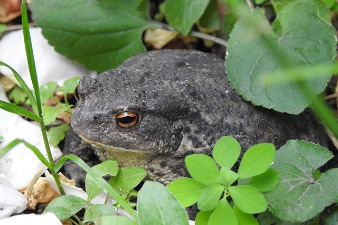Here are some Organic Pest Control Options for Your Garden
Growing a chemical-free garden is the goal of any homesteader so it’s vital to find organic pest control options for the garden. There will always be hungry pests looking for an easy meal in the garden, fortunately, there are several organic methods of repelling and killing these unwanted pests.
 Put some of these organic pest control options to work in your homestead garden so you can enjoy the fruits of your labors instead of hungry pests.
Put some of these organic pest control options to work in your homestead garden so you can enjoy the fruits of your labors instead of hungry pests.
Beneficial Bugs
Certain bugs are beneficial to vegetable plants and flowers. The ‘good’ bugs destroy the ‘bad’ bugs before they can feast upon tender garden plants and flower buds.
* Flower Flies are often mistaken for wasps with their translucent yellow color and brown-banded body. Flower Flies devour aphids and other soft-bodied garden pests.
* Lady Bugs are the most beneficial bugs to have in your garden. Lady Bugs feast on aphids, scale insects, mites, mealy bugs, and any other soft-bodied garden pests.
* Praying Mantis will eat aphids, fruit flies, crickets, and blue bottle flies.
* Stink Bugs will devour caterpillars and leaf beetle larvae before they can destroy garden vegetation.
* Spiders are predatory and are always on the lookout for an insect meal and will feast on a wide array of garden pests before they can damage plants.
Garden Toads
Garden toads are free organic pest control and will feast on garden pests like slugs, sowbugs, beetles, moths, caterpillars, cutworms, and various borers. One toad can easily rid a garden or flower bed of 100‘s insects every night.
 Toads love cool, damp places with loose soil so they can dig into the soil and escape the heat of the day. They are also more likely to remain in an area that has lots of plantings as opposed to open, bare ground.
Toads love cool, damp places with loose soil so they can dig into the soil and escape the heat of the day. They are also more likely to remain in an area that has lots of plantings as opposed to open, bare ground.
To invite toads into your organic garden, make an indentation into damp soil, then place a handful of leaves or mulch in the indentation. Place a few large rocks, a couple of boards, or a small log on top of the indentation to create a shelter for the toads.
Companion Planting
Plants benefit from having a companion just as we do, with each one bringing a unique ability that the other can use. Companion planting allows certain beneficial bugs and birds to be drawn in while repelling harmful pests and plant diseases.
* Marigolds are a companion plant that benefits most all garden plants. This hard-working plant will keep underground nematodes away and above ground beetles at bay. The marigold scent will also repel many other destructive garden pests.
* Nasturtiums, basil, and mint repel mosquitoes, flies, and other little flying garden pests while attracting insects into the garden that are beneficial.
* Alliums or catmint will repel aphids from tender garden plants. Alliums and catmint will also help prevent black spot, powdery mildew, and mites from attacking rose bushes.
Use Rough Mulch
Ashes from the fireplace, pine needles, crushed eggshells, nut hulls, or coffee grounds placed on top of garden soil repels slugs, snails, and other creeping things. These organic mulch items have a rough texture that will repel many crawling garden pests. As a bonus, the rough organic mulch will decompose over time and improve soil quality and fertility.
DIY Organic Pest Control Sprays
* Garlic spray can be used as needed to repel a wide range of garden pests. To make, combine 10 peeled garlic cloves and 1-quart of water in a blender. Strain and add 1-cup of cooking oil to garlic and water mixture. Dilute 1/2-cup of the garlic liquid with 1-gallon of water and pour into a spray bottle, then saturate garden plants.
* Red pepper spray is safe for all plants and will repel leafhoppers, spittlebugs, beetles, and loopers. To make, mix 1-tablespoon of red pepper powder and 6-drops of liquid dish soap into 1-gallon of water. Pour into a spray bottle and use as needed.




